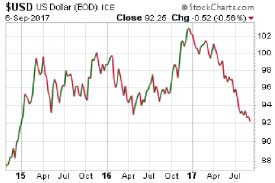“Frustration” no longer adequately describes what reformers in Congress – along with millions of investors and taxpayers who voted for reform – are feeling. For many, hopelessness is beginning to set in on the prospects for tax, budgetary, and monetary reform following Wednesday’s GOP capitulation on the debt ceiling.
Democrats coupled the Hurricane Harvey $7.85 billion disaster aid package with demands on unrelated issues in the budget. Congress didn’t pay for the bill with offsetting spending cuts, as the Club for Growth and other fiscal conservatives had urged.
Instead, this emergency spending (and more to come) will simply be added to the national credit card.

If there’s any fiscal upshot, it could be for those holding contra-dollar investments such as precious metals. The U.S. Dollar Index has been in a downtrend all year. It may now have impetus to fall further.
Months of legislative failure and inaction have caught up with Republicans. A recent Fox News poll shows that only 15% of voters approve of the job Congress is doing. Now – faced with a disaster in Texas and another one on the way in Florida that could inflict hundreds of billions of dollars more in damage – Republicans are being pushed by circumstances beyond their control.
Their president has all but given up on them. He is, understandably, beyond frustrated with feckless Republican leadership on Capitol Hill.
House Speaker Paul Ryan and Senate spoiler vote John McCain have seemingly devoted more effort to publicly criticizing President Donald Trump’s choices of words than passing GOP legislation.
Trump Joins with Democrats on Debt Ceiling Extension
Perhaps Trump now sees reaching out to Democrats as his only viable political path forward. On Wednesday, according to Politico, Trump “turned on Republican leaders in Congress when he caved to Democrats’ demands to raise the debt limit and fund the government for three months, setting up a brutal year-end fiscal cliff.”












Leave A Comment